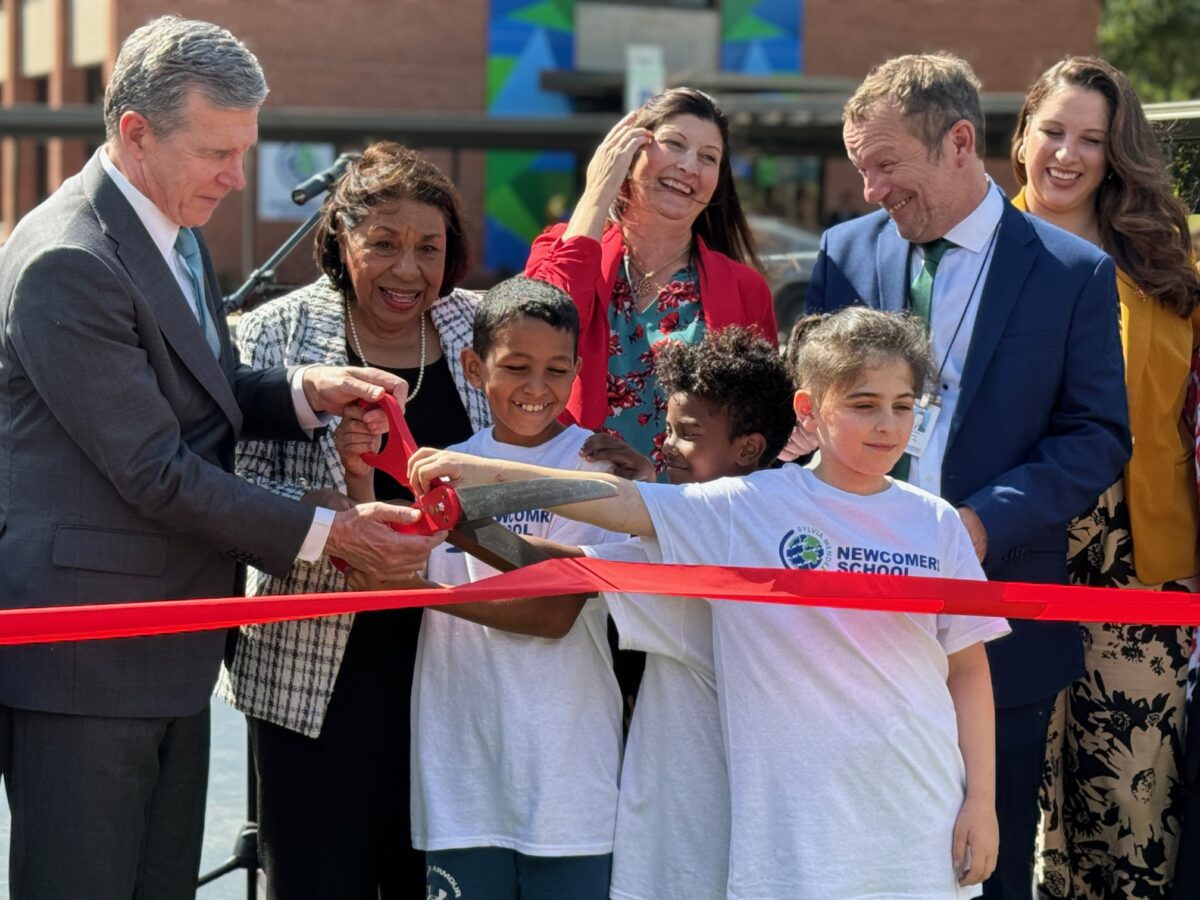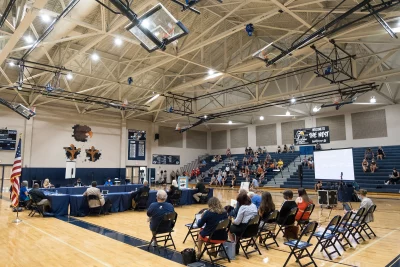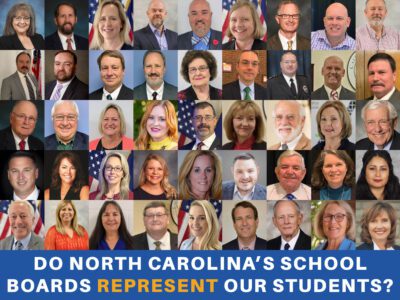

Share this story
Editor’s Note: This article was first published by Enlace Latino NC.
Without representation, Latino students in North Carolina may feel like no one is looking out for their interests.
North Carolina public schools are serving more Latino students, but that diversity is not reflected on school boards.
Without representation, Latino students may feel like no one is looking out for their best interests.
According to an analysis by the Center for Racial Equity and Education (CREED), in 2022 Latinos represented more than 20% of students in public schools. However, they identified that less than 1% of school board members are Latino.
These boards play a critical role in allocating resources and making decisions about the educational direction of the schools under their jurisdiction.
Elaine Townsend Utin is the co-founder and executive director of LatinxEd, an educational nonprofit that advocates for Latino representation in school leadership.
According to their perspective, greater Latino representation means better academic performance for students from this community.
“In order to guarantee to the Latino community that we seek to solve challenges that affect them, we need to invest in their voices, their ideas, their creativity,” added Townsend Utin in an interview with Enlace Latino NC. “They need to be in those spaces that ultimately have the power during decision-making.”
According to an analysis by the Center for Racial Equity and Education, in 2022 Latinos represented more than 20% of students in public schools. However, they identified that less than 1% of school board members are Latino.
— CREED
Opening the path of representation
Alexandra Valladares graduated from Hillside High School of the Durham Public Schools (DPS). During high school, she faced language barriers and had to adapt to a new educational system after migrating with her single mother to the United States.
“I was able to experience what it is like to not have support,” Valladares told Enlace Latino NC. “But I was also able to value the support that certain educators gave me.”
As the first Latina on the DPS Board, Valladares became the representation she would have wanted while studying.
“There we are opening doors because our young people have to see those examples,” Valladares said. “They have to see someone who came out of the classroom, from the ESL (English as a Second Language Program), someone who did not speak English and who faced trauma in their journey of immigration and adaptation to a new country.”
The Latino student community is diverse. Some students are fully bilingual and have the support of their families, while others face greater difficulties with English and are the first in their families to navigate the country’s school system.
Valladares added that some of the problems Latino students face include bullying, disparities in discipline, as well as a lack of bilingual communication from teachers and principals.
During her time on the Board, she has expanded the International Baccalaureate and Dual Language Immersion programs in Durham Public Schools. These initiatives, she explained, benefit Latino children by highlighting their skills, which are sometimes overlooked due to a lack of fluency in English.
“Some young people see the injustices,” Valladares said. “Sometimes they feel challenged because they see that there may be bias with discipline and opportunities to enter advanced classes or new programs.”
Without representation, Latino students may feel like no one is looking out for their best interests.
Challenges from the Board of Education
Townsend Utin highlights that the DPS School Board is an example for other jurisdictions to follow in terms of increasing Latino representation in leadership positions.
In 2022, Emily Chavez was elected to the DPS Board, joining Alexandra Valladares. This means that 29% of the 7-member Board is now represented by Latinas in a district where 34% of students are Latino.
Despite the advancement, being the first Latina in this leadership position presented a challenge for Valladares due to prejudice in a predominantly white space.
“During the time I have been on the board I have had to feel alone at times in the fights,” said Valladares about her experience since 2020 in this position.
For example, she explained that at Riverside High School, undocumented students were being threatened by a sheriff with a history of racial assaults. Despite having evidence from several cases, her colleagues did not mobilize to help and even opposed her decision to intervene.
After several attempts, she managed to organize two forums with parents and students with the superintendent, which ultimately resulted in the officer’s removal.
“I could see that even with my power or my position in this area, sometimes changes cannot be achieved,” Valladares said. “But with the support of the community, it can be achieved.”
Latina pioneer in 2023
Elizabeth “Liz” Monterrey, elected in 2023, became the first Latina on the Charlotte-Mecklenburg Board of Education (CMS). About 31% of CMS students are considered Hispanic or Latino.
Monterrey said Latino representation on school boards is crucial to addressing the disproportionately low academic performance of Latino students in public schools.
“Latino students are the lowest performing students overall at CMS, and that is a big challenge that we need to address,” Monterrey told Enlace Latino NC.
One in four of these Latino students are “chronically absent,” meaning they miss at least 10 percent of their enrolled days. Chronic absenteeism coincides with poor grades and lower graduation rates.
She explained that, without understanding the immigration context, absenteeism can be misinterpreted as lack of interest or bad behavior. However, she added that “these students are likely supporting their families” because of the needs within immigrant households.
The presence of multilingual teachers and staff at CMS is crucial to fostering student and parent engagement, Monterrey noted.
In CMS schools, only 65% of students who speak English as a second language graduate on time, compared to 82% of all students.
She said artificial intelligence can also serve as a tool to improve translation services and better understand educational material.
Why aren’t there more Latino candidates?
Running for school boards requires resources like time, money, and connections, which have historically been less accessible to marginalized communities. The low electoral participation of Latinos in North Carolina aggravates the situation.
This reality was evident in the victory of Monterrey in CMS, who won thanks to the vote of various communities.
Latinos make up about 15% of the county’s population. However, they only represented about 2% of the votes cast in the 2023 municipal elections in Mecklenburg, including the Board of Education. Of the 43,873 Hispanic voters registered in the county, 5.6% voted.
Wendy Padilla is a Latina candidate who ran for the Orange County Board of Education because she has seen many injustices in public schools for Latino students and students from other underrepresented communities such as Native Americans.
However, she sees that other people interested in helping do not apply due to the perception of the task as thankless.
“But if you want to make a change in your community and you want to uplift your people or uplift people, which is the way we should think, do it because help will come,” she said.
How to involve more Latinos on school boards
Monterrey emphasizes that, although it is difficult to achieve the necessary representation, everyone can achieve it if they are interested. “They are not going to hand it to us. We need to take it,” she added.
To achieve a greater presence, she emphasized that the community must understand a clear message: “You deserve to be there. You deserve a seat at the table.”
Diana Urieta is co-developer and director of Juntos, a program designed to help Latino students. She mentioned that, despite the stereotype, she has noticed that Latino parents want to be involved in their children’s education.
“Sometimes it’s really important that we incentivize and then provide the resources necessary for parents to be successful in those types of roles, in those meetings,” Urieta said.
Townsend Utin expressed that community support is necessary to get more Latinos to apply for management roles and stay in them.
That’s why her organization created the LatinxEd Fellowship to support leadership development in educational positions throughout North Carolina.
“We’re really striving to open the doors to our entire community and tell them that if you truly want and are trying to create a more inclusive and equitable education system in North Carolina, there is a place for you here,” she said.




